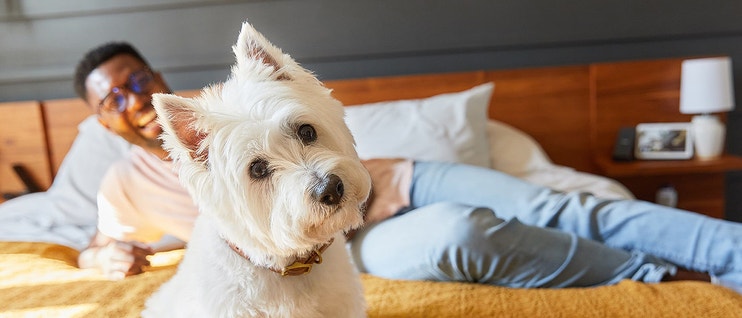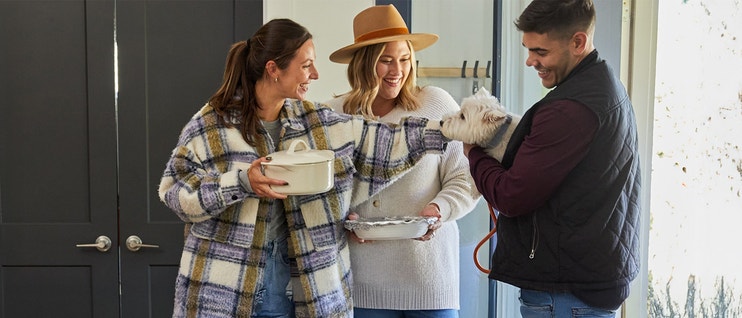
What Do I Do If I’ve Found a Lost Dog?
There's a good chance you will eventually come across a dog that appears to be lost or homeless. As a dog-lover, your first instinct will probably be to help the pooch. But what do you do when you see a dog that might be a stray? Before you take action, remember these important safety precautions.
What to do when you find a lost dog
If you’ve found a dog, stay calm.
Dogs respond to our emotions and behavior, so it’s important to stay calm. This will likely help calm the dog you’ve found and put you in a good position to help them.
Never assume a stray dog you don’t know will be comfortable with you just because you know you’re a safe human and wouldn’t do anything to harm them. Just stay calm and do what you can to help them from whatever distance keeps them as calm as possible.
Be safe and cautious around lost or stray dogs.
A lost-looking dog strolling the streets of your town may be ill, confused, scared or hurt. They may also have been abused. Any of this can make the dog’s behavior unpredictable.
If you find a lost dog while walking your own, or near an area where your dog is playing, keep your dog away from the one you don’t know. Either dog may become frightened or aggressive in the unusual situation, which can add to emotional distress.
Move and speak slowly and gently.
If you make sudden or fast movements, you may frighten the dog (who is probably already a little stressed out). A frightened dog is much more likely to act out or bolt away, putting that dog and others at unnecessary risk. Try not to run or chase the dog, since they may see that as a threat or a game and decide to run away from you. Calmly approaching the dog and letting them come to your calls is a better plan.
Consider offering the lost dog some water or a small treat.
If the dog has been away from their home, it may have been some time since they had food or water. If the dog is hesitant or suspicious about your good intentions, offering a dog treat may help you earn their trust. Keep in mind that dogs can have food allergies or sensitivities just like humans, so try to stick to treats designed specifically for dogs.
Be sure to offer food or water from a safe distance, and never from your hand. Put the offering on the ground and let them come on their own if they choose.
Help the dog feel safe and secure.
If the dog is willing to go with you, give them a secure area to rest where they feel safe and comfortable away from any pets, children or loud noises. They’ve probably been through a lot, and if they trust you enough to follow your lead, encourage them by letting them relax while you follow up with phone calls on their behalf.
Check if the lost dog is wearing a collar and tags.
If the dog has a collar and tags, there's a good chance they’re simply a lost pet, rather than a dog that’s used to life on their own. A family pet that’s gotten lost will likely have some training and may be more accustomed to being around people.
If the dog is willing to come to you and fully at ease, you may have the opportunity to attach a leash to their collar or check their tags, which should have contact information to help you reach their family.
Often checking the tags means you’ll be able to call the dog’s favorite human and reunite them directly. But there are some scenarios, like finding an injured or unwell dog, that might prompt you to call the experts first.
Call an expert to help care for the lost dog.
If a stray dog doesn’t come to your calls, or doesn’t appear to have a collar with tags, it is often best to call the experts — your local police or animal control office. You could also reach out to local animal shelters, or an animal hospital if the dog seems like they might need veterinary care. Organizations like these are experienced with helping homeless and lost dogs. Thanks to their training, they can quickly and safely guide you through the situation.
Things to tell them when you call:
- Report that you have found a lost dog.
- Share the dog's current location, noting whether it is in distress or restrained in any way (leash, crate, etc.).
- Be ready to give a description of the dog, including the size, color/breed, and whether they have visible injuries or identification (like a collar and tags). Be sure to report any strange or odd behavior, too.
- Keep an eye on the dog (from a safe distance) so you can update helpers when they arrive.
Contacting the authorities is also a good first step if you are concerned the animal may have been harmed or neglected. They can help you navigate how best to help the dog you’ve found.
Help find the lost dog’s family.
Once you’ve reported the lost dog to experts, work with them on how best to follow up. If the lost dog doesn’t have tags or the contact information on them is a dead end, you can do more to help.
- Animal shelters and hospitals can use a painless scanner to see if the dog you’ve found has an identification microchip — and microchips work even if the dog has managed to slip their collar off!
- Services like PetLink (opens in new window) are designed to help reunite pets with their human families, and you can report a found or lost pet through their online portal.
- Put up “Found Dog” posters around your neighborhood including a photo and description of the dog, as well as contact information for reaching you.
- Let your friends and local community know in person, over the phone or via social media. Include a photo of the dog in your outreach whenever possible; who wouldn’t want to share a photo of a lost dog to try to help them find their humans?
- Put a “Found Dog” message in your local community paper or newsletter. We live in an increasingly digital world, but don’t underestimate the power of print!
Be extra careful if someone claims the lost dog is theirs.
We all want to save the day and make sure dogs in our care find their families, but lost dogs need you to be careful when a human turns up to take them home. If the lost dog is staying with you while you help search for the owner, people will reach out to you if they want to claim the dog is theirs. Here are a few ways to be sure you’ve got the right human for the dog you’ve found:
- Ask to see photos of them with the lost dog. They’ll probably have photos of them with the dog, and you can check to see if it seems like the right dog or just a lookalike in the pictures.
- Request official proof of ownership. Veterinary records, registration or license papers, etc. can all be useful paperwork to confirm the dog is theirs.
- Watch the dog for clues. When the dog sees/smells this person, how do they react? Do they look happy and comfortable going with them? Or do they seem ambivalent, nervous or uninterested?
If you have any doubts at all, even small ones, it’s best not to hand over the dog. Let them know that the authorities will need to confirm that the dog is theirs before you can hand it over.
Is it OK to adopt a stray dog?
This is a legal question, and as always, legal questions depend on local laws and the details of your unique situation. Talk to the authorities you’ve been working with to find the dog’s home. Let them know that if the search isn’t successful, you’re interested in adopting the dog. They’ll be able to give you advice and information about adopting stray dogs in general, and the lost dog you’ve found in particular.
What to do before you find a lost dog
As a dog-lover, you know it’s a good idea to be prepared for canine emergencies. Here are a few things you can do now to prepare for finding a lost dog in the future:
- Save the number for your local animal control department and police non-emergency line in your phone.
- Keep a list of local dog shelters and animal hospitals handy, in case you need additional help finding a place to care for or identify a lost dog.
- Keep a backup leash in your car for emergencies like finding a lost dog. It’s also good to have a backup in case you ever forget your dog’s regular leash.
Dogs love their people, so a lost dog needs special care and follow-up from you in order to find their family. If your dog got lost, you’d want the person who found them to be as kind and patient as possible and guide them back to you. When you find a lost dog, you have the chance to help them, and plenty of local resources can help you! Don’t be shy to ask for support. You might be surprised by how many people want to help the dog you’ve found find their way home again!




